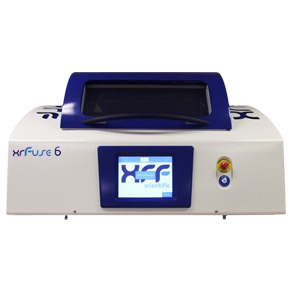Fusion Machine Suppliers Across the World
Every day, thousands of researchers worldwide entrust fusion machine suppliers with their sample preparation. Fusion machine suppliers play a vital role in ensuring that fusion machines are capable of quick, straightforward and – most importantly – consistent results. In this blog, we explore how fusion machines work, their benefits, and the different technologies that fusion machine suppliers use to prepare XRF and ICP analysis samples.
What is a fusion machine?
Fusion machines are used to prepare solid samples in “fused bead” or “fused disc” form for analysis via x-ray fluorescence (XRF) spectroscopy or inductively coupled plasma (ICP) spectroscopy.
Before fusion takes place, the sample must be ground into a fine powder. This powder is then mixed with a flux material and heated to a high temperature– usually in the region of 1000 C to 1200 C – usually in a platinum crucible. This causes the flux to melt, enabling the finely powdered sample to dissolve and diffuse through it. At this point, the mixture is cast into a mold, where it cools and solidifies into a glass disc.1
Rather than leave all these steps to be manually carried out using different pieces of equipment, fusion machine suppliers have condensed this procedure into a single automated process. Fusion machine suppliers typically design these benchtop devices that carry out the process of heating, casting and cooling either automatically or manually.
Fusion machine suppliers such as XRF Scientific build fusion machines capable of melting flux using either electric or gas heating. Many fusion machine suppliers specialize in the production of one or the other. While gas machines typically provide the highest level of automatic throughput with low levels of sample contamination, electric fusion machines deliver zero contamination with slightly lower rates of throughput. As one of the world’s leading fusion machine suppliers for XRF and ICP applications, XRF Scientific produces a full range of gas and electric fusion machines that can be run automatically or manually operated.
Fusion Machine Applications and Benefits
XRF spectroscopy involves exposing a sample to x-rays of a known energy and measuring the energy of secondary (or “fluorescent”) x-rays which are then emitted. Studying the energy discrepancy between incident and emitted electrons enables the chemical make-up of a sample to be deduced.
ICP instead relies on the ionization of samples using an extremely hot plasma to facilitate analysis.
As XRF and ICP are such sensitive techniques, it’s the priority of fusion machine suppliers to develop fusion machines that keep contamination levels low while delivering consistent and rapid sample preparation.
While many different methods can be used to prepare solid samples for ICP or XRF spectroscopy, fusion is regarded as the best method of sample preparation – not just by fusion machine suppliers – as it provides an almost completely homogeneous representation of the sample.2
XRF Scientific: Leading Fusion Machine Suppliers

With over 25 years of experience in fusion technology, XRF Scientific is one of the world’s foremost fusion machine suppliers. As such, we offer a full range of fusion machines to suit any research requirements.3
Our electric fusion machines include the Modutemp shaking fusion furnace as well as the xrFuse range of fully automated machines.
Our Phoenix line of gas fusion machines provides cost-effective solutions for any scale of laboratory.
What makes XRF different from other fusion machine suppliers?
Originally specializing in flux production, XRF Scientific brought its very first fusion machine to market in 1991. Since then, our commitment to quality and performance has seen the company grow into one of the world’s leading fusion machine suppliers to the mining, construction and chemicals industries.
To find out how our fusion machines can benefit your research or learn more about what makes us different from other fusion machine suppliers, get in touch with XRF Scientific today.









